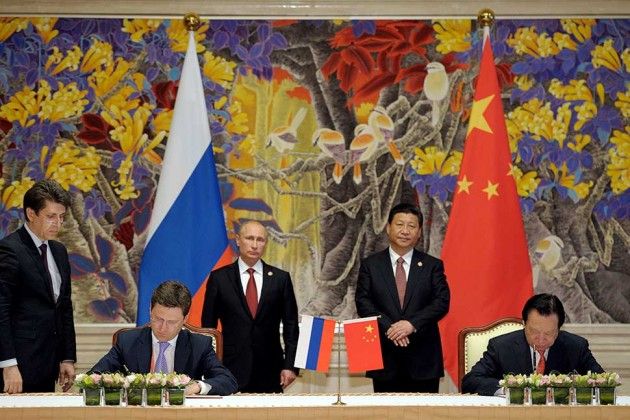 Xi and Putin at the signing ceremony in Shanghai with Gazprom's Miller (seated, left) and CNPC Chairman Zhou Jiping (seated, right)After negotiating for 15 years, China and Russia appear to have finally struck a deal to get into the natural gas business together and build a pipeline linking the two countries. Under the terms of the 30-year pact, China will secure the natural gas it needs to fuel its economy (and help clean its air), while Russia gets to diversify away from its testy relationship with Europe. Chances are that Russia won’t ever have to worry about being sanctioned by China, businessweek.com reports.
Xi and Putin at the signing ceremony in Shanghai with Gazprom's Miller (seated, left) and CNPC Chairman Zhou Jiping (seated, right)After negotiating for 15 years, China and Russia appear to have finally struck a deal to get into the natural gas business together and build a pipeline linking the two countries. Under the terms of the 30-year pact, China will secure the natural gas it needs to fuel its economy (and help clean its air), while Russia gets to diversify away from its testy relationship with Europe. Chances are that Russia won’t ever have to worry about being sanctioned by China, businessweek.com reports.
As it has been since the late 1990s, the major sticking point in the talks was the price China would pay to buy Russia’s gas. China was always willing to invest upfront cash in return for a cheaper price. Russia was always happy to take that cash, but it never wanted to give China too great a deal, lest its other customers expect similar prices. In the end, it looks as though China will commit as much as $25 billion in advance payments to help Russia build the pipeline and develop its gas fields in Siberia.
What about that price? In announcing the deal, Russia’s de facto gas czar, Alexey Miller, chief executive officer of the state-controlled gas giant Gazprom(GAZP:RM), declined to say exactly what Russia would charge China, referring to the final price as a “commercial secret.” Still, in laying out details of the deal, he offered some clues. Miller says that under the agreement, Gazprom will annually sell 38 billion cubic meters of natural gas to China for 30 years, for a total value of $400 billion.
According to a back-of-the-envelope calculation offered by Pavel Molchanov, senior energy analyst at Raymond James, that works out to roughly $10 per thousand cubic feet. This is roughly the price Russia charges its customers in Central Europe. “That is not a crazy number at all,” says Molchanov.
Moreover, Russia’s president, Vladimir Putin, said that the price China pays will be linked to the price of oil, meaning that if the price of Brent crude rises 2 percent, so will the price of the gas Russia sells to China. So how can they know the value of the deal over 30 years when we can hardly forecast what the price of oil will be a month from now?
Simple, says, Derek Scissors, an Asian economics scholar at the American Enterprise Institute: the numbers are bogus. “I don’t believe a word of it,” says Scissors, who suspects that a price hasn’t been worked out. We’ll never know for sure, but Scissors thinks it’s possible that Russia and China agreed on volumes of gas to be shipped, but decided to kick the issue of price down the road so they could start building the pipeline.
If that’s the case, the $400 billion figure is merely a bit of public relations window dressing. By releasing it, Scissors says, Gazprom can show the world that it held its ground on price and wouldn’t “go too low with China,” thereby discouraging its other customers from demanding lower prices—which they’re not even in a position to do. If Russia can appear to hold firm on prices, all the better.
This is all just speculation, but the timing is worth noting, too. Just hours before the deal was officially announced, reports went out that the two sides had failed to come to terms over price. The next thing we knew, Putin and Chinese president Xi Jinping were shaking hands on a stage in Shanghai while the heads of their respective countries’ state-owned energy companies signed on dotted lines.
If Putin had left Shanghai without a deal, it would have put him in a weaker position in early June, when he will sit down with President Obama and German Chancellor Angela Merkel. Now, he’ll have proof that Russia can lessen its dependence on Western customers, insulating itself in the long run from sanctions over Ukraine. In the wake of the criminal charges that the U.S. just levied against Chinese military officials for allegedly spying on U.S. companies, China may have found itself inclined to stick it to the U.S. by helping Russia. As they say, the enemy of my enemy is my friend. At least for now.
 В Атырау -10
В Атырау -10